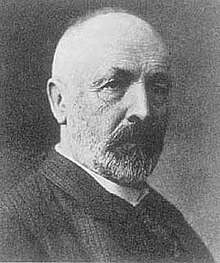Georg Cantor
Apariencia

Georg Ferdinand Ludwig Philipp Cantor (San Petersburgo, 3 de marzo de 1845 - Halle, 6 de enero de 1918) fue un matemático alemán, descubridor con Dedekind y Frege de la teoría de conjuntos, que es la base de las matemáticas modernas.
Citas
[editar | editar código]- «En matemáticas, el arte de proponer una pregunta debe ser más valioso que resolverlo».
- Original: «In Mathematics the art of proposing a question must be held of higher value than solving it». [1]
- «En particular, al introducir nuevos números, las matemáticas sólo están obligadas a dar definiciones de ellos, mediante las cuales se les confiere tal precisión y, si las circunstancias lo permiten, tal relación con los números más antiguos que, en casos dados, pueden distinguirse definitivamente de uno. otro. Tan pronto como un número satisface todas estas condiciones, puede y debe considerarse existente y real en matemáticas. Aquí percibo la razón por la que uno tiene que considerar los números racionales, irracionales y complejos como si existieran completamente como los enteros positivos finitos».
- Original: «In particular, in introducing new numbers, mathematics is only obliged to give definitions of them, by which such a definiteness and, circumstances permitting, such a relation to the older numbers are conferred upon them that in given cases they can definitely be distinguished from one another. As soon as a number satisfies all these conditions, it can and must be regarded as existent and real in mathematics. Here I perceive the reason why one has to regard the rational, irrational, and complex numbers as being just thoroughly existent as the finite positive integers». [2]
- «La esencia de las matemáticas está en su libertad».
- Original: «The essence of mathematics is in its freedom». [3]
- «La idea de considerar lo infinitamente grande no solo en la forma de la magnitud ilimitadamente creciente y en la forma estrechamente relacionada de la serie infinita convergente ... sino también de fijarlo matemáticamente por números en la forma definida del infinito completo fue forzada lógicamente a yo, casi en contra de mi voluntad, ya que era contrario a las tradiciones que había llegado a apreciar en el curso de muchos años de esfuerzos e investigaciones científicas».
- Original: «The idea of considering the infinitely large not only in the form of the unlimitedly increasing magnitude and in the closely related form of convergent infinite series...but to also fix it mathematically by numbers in the definite form of the completed infinite was logically forced upon me, almost against my will since it was contrary to traditions which I had come to cherish in the course of many years of scientific effort and investigations». [4]
- «Lo veo, pero no lo creo».
- Original: «Je le vois, mais je ne le crois pas». [5]
- «Me imagino un conjunto como un abismo».
- Fuente: Fundamentos para una teoría general de conjuntos: Escritos y correspondencia selecta. Cantor, Georg. Editor José Ferreirós Domínguez. Grupo Planeta (GBS), 2005. ISBN 9788484326953. En Google libros. Consultado el 2 de mayo de 2021.
Referencias
[editar | editar código]- Cantor, Georg (1883). Edición de José Ferreirós (2006),, ed. Fundamentos para una teoría general de conjuntos. ISBN 84-8432-695-0.
- ↑ Variational Principles in Mathematical Physics, Geometry, and Economics: Qualitative Analysis of Nonlinear Equations and Unilateral Problems. Alexandru Kristály, V. Rădulescu, Vicenţiu D. Rădulescu, Csaba Varga. Edición ilustrada. Cambridge University Press, 2010. ISBN 9780521117821. Página 261. En Google libros. Consultado el 2 de mayo de 2021.
- ↑ [https://books.google.es/books?id=5Sj5DwAAQBAJ&pg=PA113&dq=false Intimations of Infinity: The Cultural Meanings of the Iqwaye Counting and Number Systems. Mimica, Jadran. Routledge, 2020 ISBN 1000324761, 9781000324761. Página 113.] En Google libros. Consultado el 4 de mayo de 2021.
- ↑ Mathematicians under the Nazis. Segal, Sanford L. Edición reimpresa. Princeton University Press, 2014. ISBN 9780691164632. Página 248 En Google libros. Consultado el 2 de mayo de 2021.
- ↑ Understanding the Infinite. Shaughan LAVINE. Edición revisada. Harvard University Press, 2009. ISBN 9780674039995. Página 39. En Google libros. Consultado el 4 de mayo de 2021.
- ↑ Le théorème du parapluie ou L'art d'observer le monde dans le bon sens. Launay, Mickaël. Flammarion. ISBN 9782081430631. Página 143. En Google libros. Consultado el 2 de mayo de 2021.
